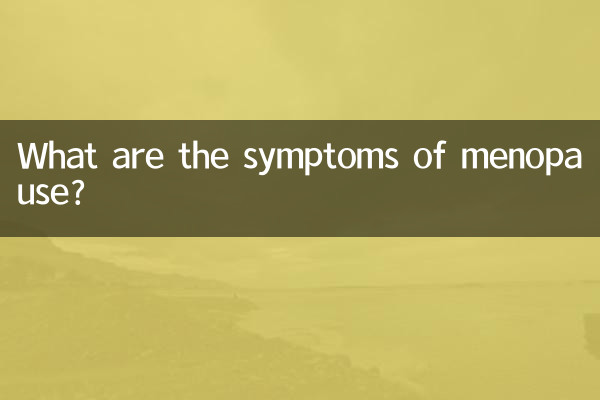What are the symptoms of menopause?
Menopause is an important stage in a woman's menstrual cycle, usually occurring between the ages of 45 and 55. During this period, due to the gradual decline of ovarian function and changes in hormone levels, women will experience a series of physical and psychological symptoms. Understanding these symptoms can help you better cope with the challenges of menopause. The following is a compilation of menopause-related topics and hot content that have been hotly discussed across the Internet in the past 10 days.
1. Common symptoms of menopause

| Symptom type | Specific performance | incidence |
|---|---|---|
| vasomotor symptoms | Hot flashes, night sweats, palpitations | 70%-80% |
| menstrual changes | Period disorders, reduced or increased menstrual flow | More than 90% |
| genitourinary symptoms | Vaginal dryness, painful intercourse, frequent urination | 40%-60% |
| mood changes | Irritability, anxiety, depression | 30%-50% |
| sleep disorders | Insomnia, excessive dreams, early awakening | 50%-60% |
| changes in cognitive function | memory loss, difficulty concentrating | 20%-40% |
2. The recently hotly discussed topic of menopause
1.Menopause and workplace performance: Many working women discuss how menopausal symptoms affect work productivity and how to communicate with colleagues and supervisors about the challenges of this special period.
2.Hormone replacement therapy (HRT): Discussions about the safety and effectiveness of HRT continue to heat up, and experts recommend individualized assessment of risks and benefits.
3.male menopause: Although it attracts less attention than women, the symptoms and responses to male menopause (testosterone deficiency syndrome) have also become a hot topic.
4.Natural remedies and lifestyle adjustments: More and more women are sharing their experiences of relieving menopausal symptoms through diet, exercise and mindfulness practices.
3. Strategies for coping with menopausal symptoms
| Symptoms | Coping methods | Effect |
|---|---|---|
| hot flashes | Wear layers of clothing and avoid spicy foods | medium |
| insomnia | Regular work and rest, relaxation exercises before going to bed | good |
| mood swings | Psychological counseling, social support | good |
| osteoporosis | Calcium supplementation, vitamin D, weight-bearing exercise | Effective for a long time |
| vaginal dryness | Use lubricants, topical estrogen | good |
4. Menopausal health management suggestions
1.Regular physical examination: Menopausal women should pay attention to bone density examination, breast examination and cardiovascular evaluation.
2.Nutritionally balanced: Increase the intake of calcium, vitamin D and omega 3 fatty acids, and reduce refined sugar and saturated fat.
3.keep exercising: At least 150 minutes of moderate-intensity exercise per week, including aerobic exercise and strength training.
4.psychological adjustment: Relieve stress through mindfulness meditation, hobbies, or professional counseling.
5.social support: Join a menopause support group to share your feelings with family and friends.
5. Expert opinions
Recently, many gynecological experts emphasized in media interviews that menopause is not a disease, but a natural physiological transition period. Although the symptoms can be uncomfortable, most women are able to get through this stage successfully with appropriate intervention. An individualized treatment plan and positive lifestyle modifications are key.
As medical advances and public awareness increase, society's understanding and acceptance of menopause is increasing. Whether it's medical intervention or self-management, there are a growing number of resources and options available to help women navigate menopause gracefully.

check the details

check the details